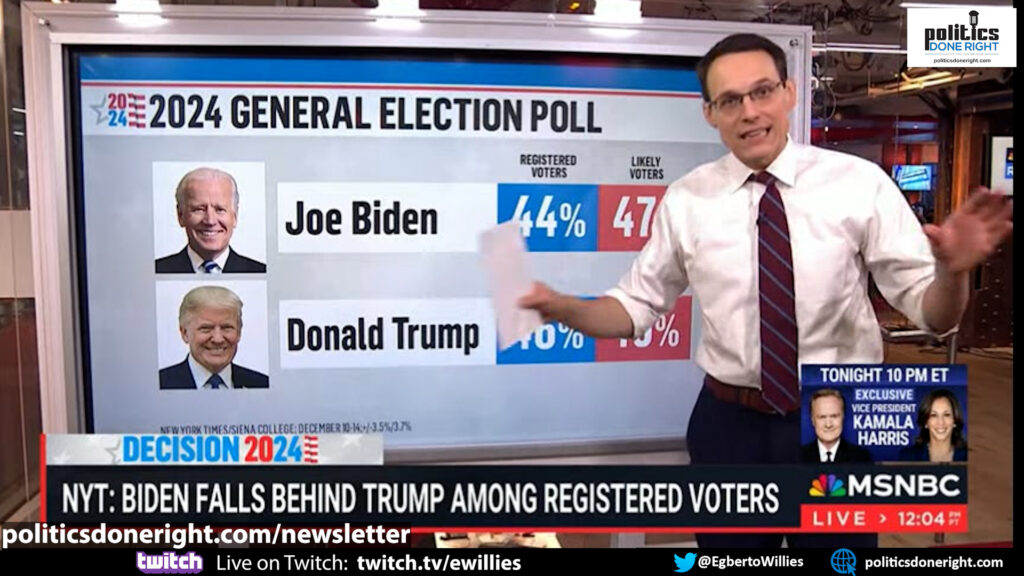The Likely and Registered Voter polls are virtually tied between Trump and Biden. Biden is overperforming with older voters while Trump is with young voters. Biden is in a better position.
How to get young voters to reengage.
Podcasts (Video — Audio)
In the fast-paced world of American politics, understanding the shifting dynamics of voter demographics is crucial for any political activist, writer, or commentator. The main question for the current election is; how can the Democratic Party win back the youth vote, a group that showed unprecedented enthusiasm in 2020 but has shown signs of wavering support since then?
The clip reveals some fascinating insights into the current state of young voter engagement and how it played out in the 2020 election. It’s apparent that, at present, there’s a need to rekindle the flame of enthusiasm among the young voter who played a pivotal role in electing Joe Biden.
One crucial point highlighted is the distinction between registered voters and likely voters. While Trump seems to hold an advantage among registered voters, it’s the likely voters who could make all the difference. This highlights the importance of not only registering young voters but also motivating them to turn out on Election Day.
Youth Engagement: Lessons from 2020
In 2020, young voters turned out in record numbers, with a margin of 24 points in favor of Joe Biden over Donald Trump among those aged 18 to 29. This massive turnout was driven by several factors:
- Appealing Policies: Biden’s campaign effectively communicated policies that resonated with young voters, including climate action, affordable healthcare, and addressing student debt. These policies not only catered to their interests but also promised a better future.
- Engagement: Biden’s campaign engaged with young voters on social media platforms and through grassroots organizing. It was a clear departure from the conventional campaign strategies and demonstrated an understanding of how to reach a digitally connected generation.
- Youth Activism: The surge in youth activism, particularly on issues like racial justice and climate change, energized young voters. They saw their political involvement as a means to bring about the change they desired.
- Unity Against Trump: The urgency to prevent a second Trump term served as a unifying force among young voters who saw the 2020 election as a critical turning point for the country.
Challenges in 2024
However, there have been shifts in this dynamic since 2020. Trump has made some inroads with younger voters, raising questions about whether they will turn out to vote in 2024. It’s important to address these challenges to ensure continued engagement:
- Messaging: Progressives need to communicate effectively with young voters. They must emphasize not only what Biden has done but also what he plans to do. This includes highlighting achievements like significant student debt relief and ambitious climate investments.
- Motivation: Activists and campaigns must motivate young voters by emphasizing the stakes involved. This means stressing the importance of their votes in shaping the future, especially in contrast to policies promoted by the opposition.
- Unity: Encouraging unity against a common opponent can be a powerful motivator. While some young voters may be disheartened by certain decisions, focusing on the broader progressive agenda can help maintain their enthusiasm.
- Grassroots Organizing: Continuing to build and support grassroots movements and organizations is essential. These entities can provide young voters with a platform to voice their concerns and take action on the issues they care about.
- Online Outreach: Given the digital age we live in, robust online outreach remains vital. Utilizing social media, podcasts, and other digital platforms to engage with young voters is key.
Conclusion
Winning over young voters in 2024, as was achieved in 2020, requires a multifaceted approach. Progressives must not only tout their accomplishments but also paint a clear picture of the future they envision. The challenges posed by Trump’s appeal to younger voters can be countered through effective messaging, motivation, and grassroots organizing. It’s a dynamic landscape, but with the right strategies, young voters can once again play a decisive role in shaping the political landscape of the United States.
Viewers are encouraged to subscribe and join the conversation for more insightful commentary and to support progressive messages. Together, we can populate the internet with progressive messages that represent the true aspirations of most Americans.

